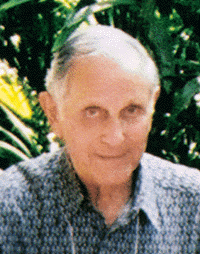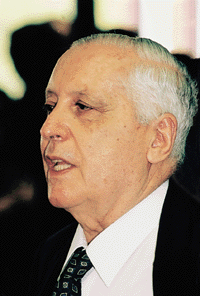Peter Hübner: On the other hand the Jew and thus the Israeli, in my eyes, has on a broad scale the otherwise extremely rare talent of integrating great scientific cognition with great artistic performance at the same time.
With us, in Germany, science and art are almost in no relation with each other and among the Jews we find both integrated in perfection in individual persons – and that, as said already, in great number.
From here also the envy of many people towards the Jews, within and without the Third Reich, can be understood.
Therefore I know by experience – who I also have to work scientifically in the Micro Music Laboratories® and at the same time have to be efficient in my artistic performance while creating Medical Resonance Therapy Music® – that I can reckon on the most practical understanding from their side.
And so, in my eyes, it is not a coincidence, but a clear statement of destiny, that my inspiration and the triumphal march of this new branch of medicine – of digital pharmaceutics: of Medical Resonance Therapy Music® – started in Israel, or more exactly: in Jerusalem on the International Conference for Pre- and Perinatal Medicine.
Medical Media Group: And why, then, do you not go with the whole thing to Israel and make use of the ideal possibilities there of a wide scientific-artistic understanding, but also of the great scientific-technical know-how there?
Peter Hübner: My friends and I thought about it already. But the political disputes there keep us from doing it. Otherwise we would perhaps have done it long ago.
Medical Media Group: And in Germany you do not find such recognition like in Israel, in the states of the former Soviet Union and in USA?
Peter Hübner: One cannot put it like this. The recognition in Germany is different – as it is also different in the already mentioned areas of the former Soviet Union, of USA and Israel.

Prof. Dr. med.
Ray H. Rosenman
In a letter to Peter Hübner
Ray H. Rosenman
Clinical cardiologist (one of the directors of the medical department of the Mount Zion Hospital in San Francisco and one the directors of the medical center of the University of California in San Francisco) and also a medical researcher.
In this capacity he was the director for cardiovascular research at the SRI International in Menlo Park, California (SRI is the former
Stanford Research Institute.)

Prof. Dr. Ilia Prigogine
In a public recommendation
Nobel Laureate for chemistry and director of the International Institute for Physics and Chemistry at the University of Brussels,
is considered to be one of the
leading scientific thinkers
of our present time.
Whereas it is easy for the Israelis to find access, due to their high scientific-artistic talent, the nuclear disaster of Chernobyl forces the physicians and scientists there to act effectively and thus to make use of digital pharmaceutics.
And with them I have made the experience that their driving force is particularly the aspect of humaneness: of pure humanity: the readiness and firm will of the physicians to help those who were hit by the disaster and specially to help the children – by all means and under all circumstances.
And with them I have made the experience that their driving force is particularly the aspect of humaneness: of pure humanity: the readiness and firm will of the physicians to help those who were hit by the disaster and specially to help the children – by all means and under all circumstances.
Medical Media Group: And in the USA?
Peter Hübner: There I find among the physicians and scientists interested in this new branch of medicine mainly persons of Jewish origin – which means, again persons with an excellent talent in the artistic field and in the field of science as well.
It is certainly no coincidence that Albert Einstein, for instance, seriously practiced playing violin.
It is reported that he once came with his violin to his physics lecture at the university, unpacked the instrument and played in front of his students in the lecture hall. After that he packed the violin in again, said “That was it.” and went.
When I came to know Prof. Prigogine, I accompanied some of my friends who were scientists and had an appointment with him. After he heard that I was a composer in the field of classical music, he, who himself practiced playing music, almost exclusively talked to me and only about music, which annoyed my scientific friends – a reaction they thought to be logical, but which he could not understand at all.
This, actually, was the difference between a scientist and artist rolled into one, the difference between someone, who was striving for universality and in this case even was a Nobel Laureate – like Einstein too –, and young scientists, who still sought for their salvation in differentiation only.
Medical Media Group: In Germany more the separation of art and science prevails.
Peter Hübner: Unfortunately! In my opinion the reason for this is particularly, that the German Jews, gifted with both, were driven out or murdered in the Third Reich and therefore their achievements and efficiency is missing in Germany today. And a second reason is the fact, that the people officially leading institutionalized music life in Germany are not talented in music and thus are also not able to forge links between music and science.